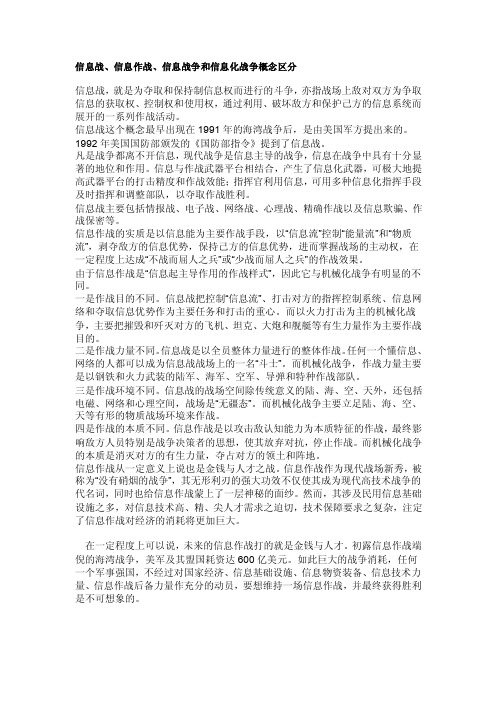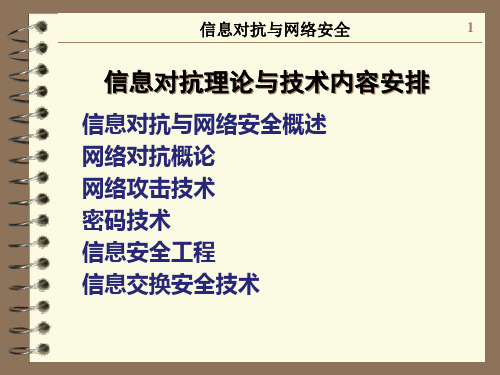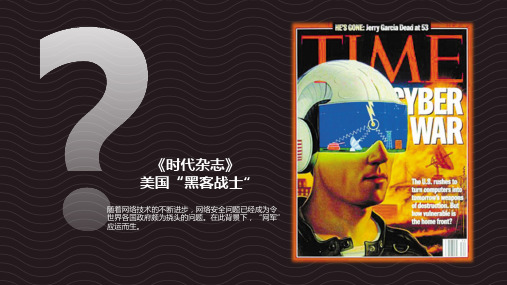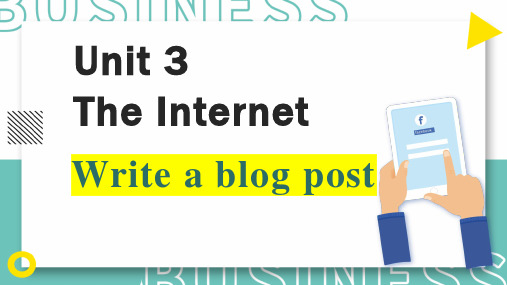信息战与网络资源 英文版
网络与信息英语作文

网络与信息英语作文The Impact of Internet and Information Technology on Our Lives。
In today's modern world, the internet and information technology have become an integral part of our daily lives. From communication to entertainment, education to business, the impact of the internet and information technology on our lives is undeniable. In this essay, we will explore the various ways in which the internet and information technology have influenced and transformed our lives.First and foremost, the internet has revolutionized the way we communicate. With the advent of email, instant messaging, and social media platforms, we are now able to connect with people from all over the world in an instant. This has not only made communication more convenient, butit has also opened up new opportunities for collaboration and networking. In addition, the internet has also changed the way we access information. With search engines likeGoogle, we can now find answers to almost any question within seconds. This has not only made learning more accessible, but it has also empowered individuals to become more informed and knowledgeable.Furthermore, the internet has also had a profound impact on the way we consume media and entertainment. With the rise of streaming services like Netflix and Spotify, we now have access to a vast library of movies, TV shows, and music at our fingertips. This has not only changed the way we consume media, but it has also disrupted traditional industries like cable television and physical music sales. In addition, the internet has also transformed the way we shop. With the rise of e-commerce platforms like Amazon and Alibaba, we can now purchase almost anything online and have it delivered to our doorstep. This has not only made shopping more convenient, but it has also created new opportunities for businesses to reach customers.Moreover, the internet and information technology have also had a significant impact on the way we work and do business. With the rise of remote work and digitalcollaboration tools, we are now able to work from anywhere in the world and collaborate with colleagues in real-time. This has not only made work more flexible, but it has also opened up new opportunities for global collaboration and innovation. In addition, the internet has also transformed the way businesses operate. With the rise of digital marketing and e-commerce, businesses can now reach customers on a global scale and sell their products and services online. This has not only expanded the reach of businesses, but it has also created new opportunities for entrepreneurs and small businesses to thrive.In conclusion, the internet and information technology have had a profound impact on our lives in countless ways. From communication to entertainment, education to business, the internet has transformed the way we live, work, and interact with the world around us. As we continue to embrace and adapt to these changes, it is important to recognize the opportunities and challenges that come with the digital age. Ultimately, the internet and information technology have the power to shape our future in ways we have yet to imagine.。
信息战、信息作战、信息战争和信息化战争概念区分

信息战、信息作战、信息战争和信息化战争概念区分信息战,就是为夺取和保持制信息权而进行的斗争,亦指战场上敌对双方为争取信息的获取权、控制权和使用权,通过利用、破坏敌方和保护己方的信息系统而展开的一系列作战活动。
信息战这个概念最早出现在1991年的海湾战争后,是由美国军方提出来的。
1992年美国国防部颁发的《国防部指令》提到了信息战。
凡是战争都离不开信息,现代战争是信息主导的战争,信息在战争中具有十分显著的地位和作用。
信息与作战武器平台相结合,产生了信息化武器,可极大地提高武器平台的打击精度和作战效能;指挥官利用信息,可用多种信息化指挥手段及时指挥和调整部队,以夺取作战胜利。
信息战主要包括情报战、电子战、网络战、心理战、精确作战以及信息欺骗、作战保密等。
信息作战的实质是以信息能为主要作战手段,以“信息流”控制“能量流”和“物质流”,剥夺敌方的信息优势,保持己方的信息优势,进而掌握战场的主动权,在一定程度上达成“不战而屈人之兵”或“少战而屈人之兵”的作战效果。
由于信息作战是“信息起主导作用的作战样式”,因此它与机械化战争有明显的不同。
一是作战目的不同。
信息战把控制“信息流”、打击对方的指挥控制系统、信息网络和夺取信息优势作为主要任务和打击的重心。
而以火力打击为主的机械化战争,主要把摧毁和歼灭对方的飞机、坦克、大炮和舰艇等有生力量作为主要作战目的。
二是作战力量不同。
信息战是以全员整体力量进行的整体作战。
任何一个懂信息、网络的人都可以成为信息战战场上的一名“斗士”。
而机械化战争,作战力量主要是以钢铁和火力武装的陆军、海军、空军、导弹和特种作战部队。
三是作战环境不同。
信息战的战场空间除传统意义的陆、海、空、天外,还包括电磁、网络和心理空间,战场是“无疆态”。
而机械化战争主要立足陆、海、空、天等有形的物质战场环境来作战。
四是作战的本质不同。
信息作战是以攻击敌认知能力为本质特征的作战,最终影响敌方人员特别是战争决策者的思想,使其放弃对抗,停止作战。
信息战

5、指挥关系
IO作战单位在联合部队指挥员的领导下利用信息作战系统进行C2W战,根据平时和战时的交战规则进行工作。
注:本文参考了信息战会议有关内容。
解读信息战、网络战、网络中心战
2004年07月22日 08:08:33 来源:国防报
所谓网络战,是指敌对双方针对战争可利用的信息和网络环境,围绕“制信息权”的争夺,通过计算机网络在保证己方信息和网络系统安全的同时,扰乱、破坏与威胁对方的信息和网络系统。从本质上讲,网络战是信息战的一种特殊形式,是在网络空间上进行的一种作战行动。与传统战争相比,网络战具有突然性、隐蔽性、不对称性和代价低、参与性强等特点。网络中心战,其英文名称为“ NetworkCentricWarfare”,是相对于传统的平台中心战而提出的一种新作战概念。所谓平台中心战,是指各平台主要依靠自身探测器和武器进行作战,其主要特点是平台之间的信息共享非常有限。而网络中心战是通过各作战单元的网络化,把信息优势变为作战行动优势,使各分散配置的部队共同感知战场态势,从而自主地协调行动,发挥出最大整体作战效能的作战样式,它使作战重心由过去的平台转向网络。不言而喻,网络中心战能够帮助作战部队创造和利用信息优势并大幅度提高战斗力。它具有战场态势全维感知能力,作战力量一体化,作战行动实时性,部队协调同步性等特点。
?IO:为在军事信息环境中加强、增进和保护己方军队收集、处理和利用信息的能力而采取的连续性军事行动,其目的是夺取各种军事行动中的优势。信息作战包括与全球信息环境的相互作用以及对敌人信息和决策能力的利用和阻止。
3、信息战和信息作战(二)
信息战:敌对双方为夺取制信息权而采取的行动;
信息对抗与网络安全概述

第1章 信息对抗与网络安全概述
4
1.1 信息时代的战争
信息战的目的是夺取信息优势
核心是保护己方的信息资源,攻击敌 方的信息控制
信息战的最终目标是信息系统、设施 赖以生存和运转的基础——计算机网 络。
第1章 信息对抗与网络安全概述
5
1.1 信息时代的战争
信息战的本质是围绕争夺信息控制权 的信息对抗
第1章 信息对抗与网络安全概述
22
1.6 理想战争
对人类破坏力最小的战争
依托国家综合实力和最新高科技进行 的战争
包括:机器人战争,克隆人战争,领 导人战争,外星球战争,虚拟战争, 鸦片战争,思想战争,传媒战争,思 维战争 。
计算机取证技术
23
计算机取证技术
数据恢复的原理是什么?当失手删除(按 SHIFT删除)文件后,该怎样恢复?启动后系 统不认硬盘如何恢复? 如何鉴定IP地址来源?
第1章 信息对抗与网络安全概述
9
1.1.2 信息战的主要形式
进攻战与防御战的关系 :
要打赢一场信息战,关键在于如何有 效地保障自身信息系统的安全性
防御占9,进攻占1。
Байду номын сангаас
第1章 信息对抗与网络安全概述
10
1.1.3 信息战的主要武器
进攻性信息战武器或技术主要有:
计算机病毒、蠕虫、特洛伊木马、逻 辑炸弹、芯片陷阱、纳米机器人、芯 片微生物、电子干扰、高能定向武器、 电磁脉冲炸弹、信息欺骗和密码破译 等。
信息对抗与网络安全
1
信息对抗理论与技术内容安排
信息对抗与网络安全概述 网络对抗概论 网络攻击技术 密码技术 信息安全工程 信息交换安全技术
信息对抗与网络安全
高英课文:Bards Of the Internet

《Bards Of the Internet》By Philip Elmer-DeWitt1. One of the unintended side effects of the invention of the telephone was that writing went out of style. Oh, sure, there were still full-time scribblers -- journalists, academics, professional wordsmiths. And the great centers of commerce still found it useful to keep on hand people who could draft a memo, a brief, a press release or a contract. But given a choice between picking up a pen or a phone, most folks took the easy route and gave their fingers -- and sometimes their mind -- a rest.2. Which makes what's happening on the computer networks all the more startling. Every night, when they should be watching television, millions of computer users sit down at their keyboards; dial into CompuServe, Prodigy, America Online or the Internet; and start typing -- E-mail, bulletin-board postings, chat messages, rants, diatribes, even short stories and poems. Just when the media of McLuhan were supposed to render obsolete the medium of Shakespeare, the online world is experiencing the greatest boom in letter writing since the 18th century.3. "It is my overwhelming belief that E-mail and computer conferencing is teaching an entire generation about the flexibility and utility of prose," writes Jon Carroll, a columnist at the San Francisco Chronicle. Patrick Nielsen Hayden, an editor at Tor Books, compares electronic bulletin boards with the "scribblers' compacts" of the late 18th and early 19th centuries, in which members passed letters from hand to hand, adding a little more at each turn. David Sewell, an associate editor at the University of Arizona, likens netwriting to the literary scene Mark Twain discovered in San Francisco in the 1860s, "when people were reinventing journalism by grafting it onto the tall-tale folk tradition." Others hark back to Tom Paine and the Revolutionary War pamphleteers, or even to the Elizabethan era, when, thanks to Gutenberg, a generation of English writers became intoxicated with language.4. But such comparisons invite a question: If online writing today represents some sort of renaissance, why is so much of it so awful? For it can be very bad indeed: sloppy, meandering,puerile, ungrammatical, poorly spelled, badly structured and at times virtually content free. "HEY 1!" reads an all too typical message on the Internet, "I THINK METALLICA IZ REEL KOOL DOOD! 1"5. One reason, of course, is that E-mail is not like ordinary writing. "You need to think of this as 'written speech,' " says Gerard Van der Leun, a literary agent based in Westport, Connecticut, who has emerged as one of the pre-eminent stylists on the Net. "These things are little more considered than coffeehouse talk and a lot less considered than a letter. They're not to have and hold; they're to fire and forget." Many online postings are composed "live" with the clock ticking, using rudimentary word processors on computer systems that charge by the minute and in some cases will shut down without warning when an hour runs out6. That is not to say that with more time every writer on the Internet would produce sparkling copy. Much of the fiction and poetry is second-rate or worse, which is not surprising given that the barriers to entry are so low. "In the real world," says Mary Anne Mohanraj, a Chicago-based poet, "it takes a hell of a lot of work to get published, which naturally weeds out a lot of the garbage. On the Net, just a few keystrokes sends your writing out to thousands of readers."7. But even among the reams of bad poetry, gems are to be found. Mike Godwin, a Washington-based lawyer who posts under the pen name "mnemonic," tells the story of Joe Green, a technical writer at Cray Research who turned a moribund discussion group called rec.arts.poems into a real poetry workshop by mercilessly critiquing the pieces he found there. "Some people got angry and said if he was such a god of poetry, why didn't he publish his poems to the group?" recalls Godwin. "He did, and blew them all away." Green's Well Met in Minnesota, a mock-epic account of a face-to-face meeting with a fellow network scribbler, is now revered on the Internet as a classic. It begins, "The truth is that when I met Mark I was dressed as the Canterbury Tales. Rather difficult to do as you might suspect, but I wanted to make a certain impression."8. The more prosaic technical and political discussion groups, meanwhile, have become so crowded with writers crying forattention that a Darwinian survival principle has started to prevail. "It's so competitive that you have to work on your style if you want to make any impact," says Jorn Barger, a software designer in Chicago. Good writing on the Net tends to be clear, vigorous, witty and above all brief. "The medium favors the terse," says Crawford Kilian, a writing teacher at Capilano College in Vancouver, British Columbia. "Short paragraphs, bulleted lists and one-liners are the units of thought here."9. Some of the most successful netwriting is produced in computer conferences, where writers compose in a kind of collaborative heat, knocking ideas against one another until they spark. Perhaps the best examples of this are found on the WELL, a Sausalito, California, bulletin board favored by journalists. The caliber of discussion is often so high that several publications -- including the New York Times and the Wall Street Journal -- have printed excerpts from the WELL.10. Curiously, what works on the computer networks isn't necessarily what works on paper. Netwriters freely lace their prose with strange acronyms and "smileys," the little faces constructed with punctuation marks and | intended to convey the winks, grins and grimaces of ordinary conversations. Somehow it all flows together quite smoothly. On the other hand, polished prose copied onto bulletin boards from books and magazines often seems long- winded and phony. Unless they adjust to the new medium, professional writers can come across as self-important blowhards in debates with more nimble networkers. Says Brock Meeks, a Washington-based reporter who covers the online culture for Communications Daily: "There are a bunch of hacker kids out there who can string a sentence together better than their blue- blooded peers simply because they log on all the time and write, write, write."11. There is something inherently democratizing -- perhaps even revolutionary -- about the technology. Not only has it enfranchised thousands of would-be writers who otherwise might never have taken up the craft, but it has also thrown together classes of people who hadn't had much direct contact before: students, scientists, senior citizens, computer geeks, grass-roots (and often blue-collar) bulletin-board enthusiasts and most recently the working press.12. "It's easy to make this stuff look foolish and trivial," says Tor Books' Nielsen Hayden. "After all, a lot of everyone's daily life is foolish and trivial. I mean, really, smileys? Housewives in Des Moines who log on as VIXEN?"13. But it would be a mistake to dismiss the computer-message boards or to underestimate the effect a lifetime of dashing off E-mail will have on a generation of young writers. The computer networks may not be Brook Farm or the Globe Theatre, but they do represent, for millions of people, a living, breathing life of letters. One suspects that the Bard himself, confronted with the Internet, might have dived right in and never logged off.1.电话发明的一个意想不到的副作用就是使写作脱离原有的格式(风格)。
ppt军理 网络战

网络战的影响
网络战可以轻易摧毁一国的金融系统 、通信系统和基础设施,而这耗费的 成本远远低于建造一架第五代战斗机 。
网络战的作用并没有如此明显
曾在克林顿和布什政府内任网络安全顾问的理查德·A. 克拉克在其新书 《网路战》中认为,美国的电力网络和银行系统极易遭到网络攻击, 网络攻击能够让全美国的火车乱套,输油管线爆炸,它能破坏电力系 统,破坏金融纪录。克拉克认为网络战的后果将是灾难性的。
美国“网络沙皇”霍华德·施密特完全排除了对电力系统可能的网络攻击。 他说“至于进入电力系统,我认为它不能成为现实”。乔治敦大学的网络 问题评论家莫罗佐夫甚至认为,克拉克关于“网络战争”和“网络核弹”的 说法完全是科学幻想。
兰德公司认为:实施网络战的效果是 有限的。
首先,网络战的实施对象有限。实施网络攻击的前提是目标系统存在 缺陷和漏洞,目前黑客所有的行动,都是针对有漏洞的系统。其次, 网络攻击的效果不明显。最好情况下,网络战争行动“能够搞乱或者迷 惑军事系统的操作人员,而且那只是临时性的”。第三,网络战很难起 到决定性作用。从目前对美国网络的攻击破坏评估来看,美国每年损 失仅仅几亿美元。此外,网络威慑的威慑力有限。它“无法像核威慑那 样工作”
“BlackEnergy”的知名木 马,成功地扰乱了乌克 兰部分地区的供电。
冲突可以发生的领域。 自此互联网正式成为 战场。如今物联网的
电机测试”证实了数字攻击可以用来
其无法使用。
兴起可能导致网络战
摧毁物理物体(发电机)
场进入我们的家园。
经典案例
法海军内部计算机受病毒入侵。 科索沃战争南联盟实施网络攻击北约军队
平台中心战: 各平台主要依靠自身探测器和武器进行作战,其主要特点是平台之 间的信息共享非常有限。 网络中心战: 通过各作战单元的网络化,把信息优势变 为作战行动优势,使各分散配置的部队共同感知战场态势,从而自主地协调行动, 发挥出最大整体作战效能的作战样式,它使作战重心由过去的平台转向网络。不 言而喻,网络中心战能够帮助作战部队创造和利用信息优势并大幅度提高战斗力。 它具有战场态势全维感知能力,作战力量一体化,作战行动实时性,部队协调同 步性等特点。
Unit 3 The Internet 课件-高中英语人教版(2019)必修第二册

Choose one of the topics below and use the notes to draft your blog post.
Online shopping sites
Online chat rooms
• Use a website you are Social networking apps • Don’t give out too
language powerful. Add details.
(Examples/Definitions/Comparison)
Ending Ask for comments.
短语积累
1. post comments 2. click on 3. protect your privacy 4. give out the address or phone number 5. steal your identity 6. a common and serious problem 7. become a target of a troll or cyberbully 8. stir up trouble 9. post embarrassing photos and information 10. make fun of 11. the online troublemakers
strong
Why do we have comments in a blog?
interactivity To hear different voices from the outside world (互动性) To put heads together and come up with more ideas
Language Advanced高级的 expressions or sentence patterns句
chap-1

信息安全专业
网络安全协议
常见的不安全因素
物理因素:物理设备的不安全, 物理因素:物理设备的不安全,电磁波泄漏等 系统因素:系统软、硬件漏洞,病毒感染, 系统因素:系统软、硬件漏洞,病毒感染,入侵 网络因素:网络协议漏洞,会话劫持、数据篡改, 网络因素:网络协议漏洞,会话劫持、数据篡改, 网络拥塞, 网络拥塞,拒绝服务 管理因素:管理员安全意识淡漠, 管理因素:管理员安全意识淡漠,误操作
OSI mnemonics All People Seem To Need Data Processing Please Do Not Throw Sausage Pizza Away
Actual data flow
24
信息安全专业
网络安全协议
TCP/IP模型 模型
25
信息安全专业
网络安全协议
OSI与TCP/IP模型的比较 与 模型的比较
参考教材
1.荆继武等, PKI技术,科学出版社,2008 2.何泾沙译,Linux防火墙第三版,机械出版社,2006 3.Charlie Kaufman等著,许剑卓、左英男等译 “网络安全——公众世 界中的秘密通信”,第二版,电子工业出版社,2004
课程主页: /course 课程助教:丁戎 ( xwx1226@ ),电三楼305
8
信息安全专业
网络安全协议
网络安全事件——不安全Email 不安全
给乙发出Email 甲给乙发出 邮件在 传送过 程中被 截取 乙收到该Email 乙收到该 偷盗者篡改 邮件后以甲 的身份重新 发送
A
B
1.如果偷盗者截取 如果偷盗者截取Email 后不发给乙,怎么办? 后不发给乙,怎么办? E
网络安全协议
- 1、下载文档前请自行甄别文档内容的完整性,平台不提供额外的编辑、内容补充、找答案等附加服务。
- 2、"仅部分预览"的文档,不可在线预览部分如存在完整性等问题,可反馈申请退款(可完整预览的文档不适用该条件!)。
- 3、如文档侵犯您的权益,请联系客服反馈,我们会尽快为您处理(人工客服工作时间:9:00-18:30)。
3. Information Warfare in the students’ perception. Sociological survey. - The most part of students do not realize the meaning of information terror. - Young users don’t understand that invisible methods of information terror can manipulate theirs perceptions and change their opinions and ideology.
- If they don’t know the enemy, they cannot resist or fight him. They are potential victims of information terror.
3. Information Warfare in the students’ perception.
Information Warfare in the students’ perception.
%
Information Terrorists are:
more 50 couldn’t answer this question 12,5 11,3 9 other mass-media with lack of principles
1. Terrorism and Information Warfare.
"There are but two powers in the world, the sword and the mind. In the long run the sword is always beaten by the mind." Napoleon Bonaparte
Information Warfare and Internet Resources.
Andrianova Maria Igorevna Saratov State University, Sociology Department, 4 year student.
Information Warfare and Internet Resources.
2. Internet peculiarities that make Information War effective in the Internet. From the technical viewpoint, the Internet is a network of networks, “informational superhighway”. From the social aspect, Internet is a cultural phenomenon, similar to book printing, radio, television.
Pornographic and sexual child exploitation via Internet.
1996
2001
2006 ???
113 1500 cases cases
65% of sexual solicitation via Internet happened in chats.
people who get information by illegal methods and use it to their own purposes
the authors of computer viruses themselves, hackers, spammers,Bill Gates
51,30%
3. Information Warfare in the students’ perception. Sociological survey.
41,3% of respondents have suffered from computer viruses being uncontrollably downloaded from Internet. 58,7% of respondents haven’t experienced such problems.
Objectivities of any act of terrorism: - attraction of maximum attention of world community - violence - fear - political power - perpetrated against noncombatans - generation fear to the broader audience
3. Information Warfare in the students’ perception. Sociological survey.
■ 53,8% of respondents think that
it isn’t necessary to set up any kind of control in Internet. ■ 30% of respondents believe that it will be good if there is some supervisory organization responsible for that.
3. Information Warfare in the students’ perception. Spam is the mass unapproved posting of messages without agreement of receivers by e-mail or other methods of personal exchanging the information. ( ) January 2002 December 2002 Every 199th e-mail contained spam Every 8th e-mail contained spam
1. Terrorism and Information Warfare.
The Information War is waged on three levels
personal
corporative
global
2. Internet peculiarities that make Information War effective in the Internet.
2. Internet peculiarities that make Information War effective in the Internet.
Polyphonic quality of the Internet, on the one hand, is a democratic access to the information; on the other hand, it is often a tool of manipulation.
3. Information Warfare in the students’ perception. Sociological survey.
Have received spam later Have received spam Haven't received spam
11,20%
37,50%
3. Information Warfare in the students’ perception. Democratic states
High communication compactness
1. Terrorism and Information Warfare.
Irish Republican Army ETA Spanish Basque
1. Terrorism and Information Warfare. “Information warfare is the offensive and defensive use of information and information systems to deny, exploit, corrupt, or destroy, an adversary's information, information-based processes, information systems, and computer-based networks while protecting one's own”.
3. Information Warfare in the students’ perception. Sociological survey.
33%
High school pupils SSU students
Age of respondents
70,00% 60,00% 50,00% 40,00% 30,00% 20,00% 10,00% 0,00% 13-17 18-22
1. Terrorism and Information Warfare. 2. Internet peculiarities that make Information War effective in the Internet. 3. Information Warfare in the students’ perception.
67%
40%
60%
male female
3. Information Warfare in the students’ perception. Sociological survey. – 40% of respondents use Internet every day, – 52,5% use Internet through home PC, and 30% use Internet at the educational institution, – 53,8% of respondents have used Internet for 34 years, 21% - over 4 years, – 40% of respondents surf Internet during 2 hours daily as a rule, 33,8% of respondents stay in Internet for an hour or less.
